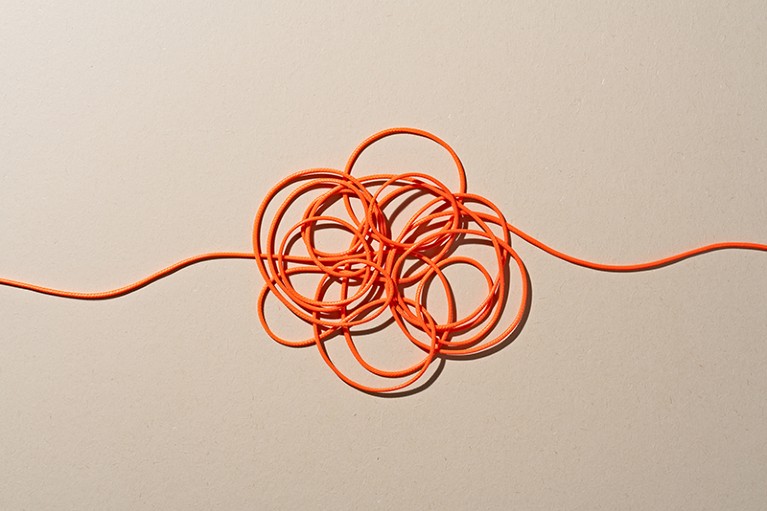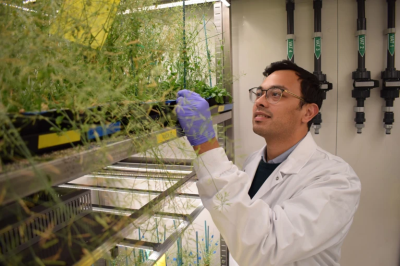
Credit: MirageC/Getty
When I first arrived in the United States as an international student from India, I was immediately struck by the steep learning curve involved in communicating effectively in English. I’m a former research fellow at the Indian Institute of Technology Delhi in New Delhi, and a Bengali speaker, as well as being fluent in Hindi and another common language in India, Telugu.
My education from preschool onwards was conducted in English. But although I’m fluent, interacting with people who have English as their first language can still present challenges for me. I don’t always feel confident with the technical jargon, idioms and cultural references that they use.

Collection: Science communication
Now I study RNA biology as a postgraduate researcher at Yale University in New Haven, Connecticut, where the challenge I face is not just to master the technical jargon but also to find my voice in a language that feels foreign in social and professional settings. This language gap can feel like an invisible wall that keeps me slightly detached from others and can make me feel like an imposter, afraid that I’ll say the wrong thing or fail to fully convey my ideas.
Public speaking, whether during lab meetings with peers, presenting my work at conferences, or giving lectures to visiting summer undergrads, often feels like a delicate dance. My mind scrambles to find the right words, leaving me replaying awkward moments long after the event has passed. At times, I hesitate to speak up, even when I have something valuable to contribute. But these moments have taught me the importance of patience — learning to navigate the challenge of expressing complex ideas while juggling languages is an evolving process for me as a scientist.
Experiments have no accents
Being reticent has its benefits, helping me to retreat into my own bubble — where the distractions of the outside world fade, and all that remains is the work. Sometimes, the lab can be a haven, a place where I don’t need to rely on perfect language skills. Experiments have no accents, and pipettes don’t care about vocabulary. It’s here that I find comfort and, in a way, fluency.
My first language is the one I rely on most when a sudden burst of creativity or problem-solving takes me. I’ve often found myself thinking more clearly in my mother tongue. Something about being in quiet spaces, away from the pressure of speaking English, allows my brain to piece together solutions with clarity and focus. In those moments, it feels as if I’m giving my thoughts room to breathe — without the constraints of translation.

How sharing your science in an opinion piece can boost your career
But there are advantages to being multilingual, of course. Chief among them is the deep sense of collaboration it fosters in the lab. People who don’t speak English as a first language often gravitate towards each other, developing camaraderie. In our shared lab space, housing about 25 people, only a few have English as their first language, and the rest of us are international students. We might stumble over our words, but we understand each other’s struggle. By finding common ground, we help one another with experiments and ideas, and can even share a laugh about mutual frustrations.
However, I still often feel isolated, not just because I’m far from home, but because I live in two linguistic worlds. In one, I’m confident, expressive and full of ideas; in the other, I’m an introvert, hesitant to speak up for fear of tripping over words or misinterpreting cultural cues. Being multilingual sometimes feels like having multiple personalities — each tied to a different language, with its own strengths and vulnerabilities. I can be brilliant in my native tongue and timid in English.
But what’s clear is that my journey as a multilingual scientist has shaped not just how I work, but who I am. This balancing act has forced me to develop resilience, empathy and creative problem-solving skills — qualities I wouldn’t trade for anything. To others in the same position, I’d say: view your background not as a barrier, but as a unique foundation that empowers you to think differently and contribute meaningfully.
Embracing my multilingualism
Coming from a small town in southern India, I once questioned whether I’d belong in a place such as Yale. But the truth is, every challenge along the way has taught me that our backgrounds are not obstacles, but powerful tools that shape our perspectives. I’ve learnt that embracing my multilingualism allows me to contribute uniquely to the scientific community.
For anyone embarking on a similar journey, no matter where you’re from or what languages you speak, I’d say that your experience equips you with unique strengths. Being multilingual is a superpower that allows you to bridge worlds and ideas. I’ve found that it gives me the tools to think critically and creatively in ways that others might not.
For example, during a particularly challenging experiment, my colleagues and I were struggling to interpret some complex patterns in the data; the standard approaches weren’t providing clarity. I mentally translated the problem into my native language, breaking it down into simpler terms and concepts familiar to me. This process unveiled an overlooked variable that was affecting our results. When I shared this insight with lab mates, we adjusted our methodology accordingly, opening up fresh avenues for our research and leading to a successful outcome. It was a moment that highlighted how thinking in my mother tongue can solve problems that seem insurmountable.
So, is being multilingual a disadvantage in science? Absolutely not. It’s a special aptitude that you’ll learn to master as you go, one that makes your journey all the more remarkable.






